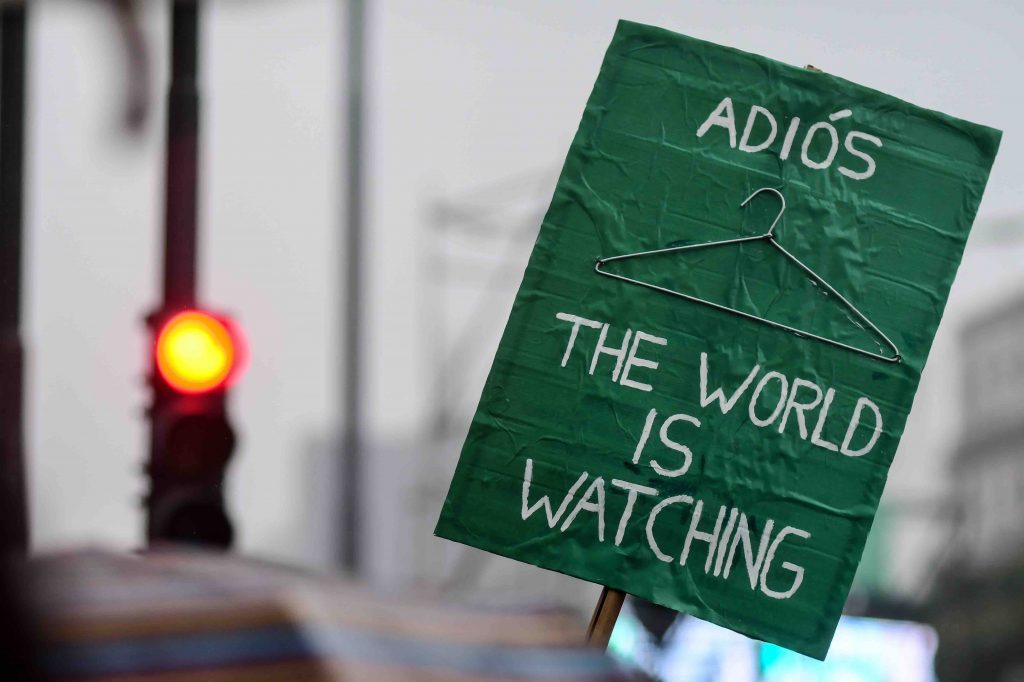Donald Trump began his presidency on Monday by striking a blow to women’s reproductive rights around the world. In an expected move, Trump reinstated a policy that punishes nongovernmental organizations in foreign countries that name abortion as a family planning option. This puts health providers in developing countries in the tough position of choosing between potentially putting their patients’s lives at risk or losing American foreign aid. Named the Mexico City policy – so called because Ronald Reagan instituted it in 1984 during a United Nations population conference in DF – it’s become a sort of tradition for incoming presidents to immediately rescind or restore the past administration’s position. As the New York Times notes, this decision lines up almost perfectly with the January 22 anniversary of Roe v. Wade.
The 1973 Helms Amendment already made it illegal to use US federal funding for abortions, so the Mexico City policy mostly keeps information about abortions from low-income communities. Under Trump, the policy – also known as the global gag rule – will become even more restrictive. The US will also take foreign aid away from NGOs offering abortion counseling or championing abortion rights in their countries. And even if these orgs fund these important services in other ways, they will lose funding from the United States. Trump’s decision comes a mere days after millions participated in the Women’s March across the US and the globe. While the march focused on intersectionality, police brutality, and economic and racial justice, many also protested the incoming administration’s proposed threats to reproductive rights.
For conservatives, the Mexico City policy is a victory in “putting an end to taxpayer funding of groups that promote the killing of unborn children in developing nations,” according to Carol Tobias, president of the National Right to Life Committee in Washington. In reality, the Mexico City policy doesn’t stop abortions in these countries. The clinics that the US penalizes for providing information about abortions mostly end up shuttering. These populations lose access to contraception, which brings about more unwanted pregnancies and abortions. According to Slate, a 2010 study revealed that the gag rule during George W. Bush’s administration “hampered Ethiopia’s efforts to address high rates of unsafe abortion,” even though unsafe abortions were the second-leading cause of death in the country.
The effects of this detrimental policy aren’t unique to Ethiopia; all across the world, women have suffered because of this policy. And after eight years without the rule, women will once again be worse off.
In 2003, in the midst of Bush’s first term as president, Susana Chavez of Centro de la Mujer Peruana Flora Tristán delivered a powerful speech at a briefing for the US Congress that’s as pertinent as ever. “A woman was recently found buried in an abandoned lot (baldío) on the outskirts of Lima,” Chavez said at the beginning of her speech. “She had been dead for several months and had died from the complications of an unsafe abortion. No one ever claimed this woman’s body, and she remained uncounted in the statistics. For the women’s health and reproductive rights movement in Peru, the global gag rule is connected to the death of this woman, and hundreds like her.”
She then dove into the prevalence of unsafe abortions in Peru, explaining how it disproportionately affects women living in poverty. The lack of access to contraception and to information about abortions makes it impossible for women to have control over their own health, life, and fertility.
Up to this day, Peru only allows abortions if it endangers the woman’s life, but the gag rule can make safe abortions – even in life-threatening cases – unattainable. “Recently a 17-year old young woman found herself pregnant with an anencephalic fetus— a fetus that, if carried to term, would have no brain and could not survive,” she added. “This kind of pregnancy is dangerous to the pregnant woman’s physical and mental health. But her request for an abortion was denied by officials at a public hospital. After being forced to give birth, she was forced to nurse the anencephalic child until its certain death. As you can see, the application of this law does not always protect the life and health of Peruvian women. It results in even more women resorting to clandestine and unsafe procedures.”
Through her speech, Chavez highlights all the ways the global gag rule threatens women’s lives, but she also pointed out the US’ hypocrisy in enacting such a policy in foreign countries. “The global gag rule has been like a ‘veto’ on this gradual political and scientific opening, by cutting off further accumulation of knowledge and the free exchange of ideas about how to deal with the issue of unsafe abortion,” she said. “We do not want this issue to be further hidden. You in the US have very active debates on abortion and your women are not dying from unsafe abortion. For us, it seems very hypocritical.”
Read the entire speech here.




